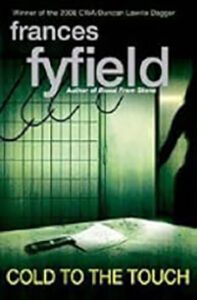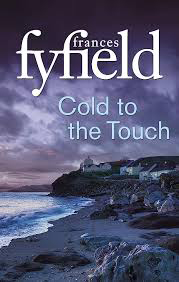Home »

Fyfield should be required reading for intro psych courses
Book Review
By Derryll White
Fyfield, Frances (2009). Cold To the Touch.
Her imagination, that mortar between facts, told her that even the sound of that burden was audible and welcome. – Frances Fyfield
 Frances Fyfield does psychological thrillers better than anyone. She creates a challenge for herself as a writer, a sleepy little seaside village named unceremoniously Pennyvale. Nothing happens there. The lives of residents are small and sometimes mean.
Frances Fyfield does psychological thrillers better than anyone. She creates a challenge for herself as a writer, a sleepy little seaside village named unceremoniously Pennyvale. Nothing happens there. The lives of residents are small and sometimes mean.
This is a story of characters more than place, personalities more than scenes. Jessica Hurley is a wild child growing older, still wild. Her mother Celia is the dominant personality of the village, outright owning half of it. Sarah Fortune is a delightful older tart who cares about select people and what happens to them. In the end she is the quiet force of the story.
‘Cold To the Touch’ enables the reader to think back to a time when life was not quite as complicated and fast as it seems now. Every action has a consequence here and there are no laugh tracks or flashbacks. Truth and reconciliation play a part here – more truth than reconciliation perhaps. Fyfield embeds herself in the story and encourages the reader to do the same. One is encouraged to invest both time and emotion.
How mean can we be to each other? And how uncaring as we put ourselves first? The reader might experience some of that while at the same time being shocked by a particular view of family. Sarah Fortune is the saving grace, but one has to read the book in order to discover why. Frances Fyfield should be required reading for introductory psychology courses.
********
Excerpts from the novel:
 KNOW YOURSELF – Then they were grinning, then giggling loudly and uncontrollably, two women who knew what it was like to make fools of themselves. A couple of anarchists in the church of ego worship.
KNOW YOURSELF – Then they were grinning, then giggling loudly and uncontrollably, two women who knew what it was like to make fools of themselves. A couple of anarchists in the church of ego worship.
A PERFECT LIFE – Not that she had ever been deluded by the notion of a perfect way of life; ambition and discontent and even a little bit of fear were so vital to achievement and survival, after all, but she knew the importance of dreaming. Of getting a dream, kicking it about, trying it on for size like a new skirt and then, if necessary, chucking it away and trying on something else. The cottage with roses round the door could mean a state of not needing, but a state of complete self-sufficiency would have to involve a complete frontal lobotomy. It was not natural.
WEATHER -The day was dreary grey and bitterly cold, a great day for housework. Sarah was thinking what a forgotten word that was and was still a stounded to find how she reacted to the weather. Here it dictated the course of every single day, instead of being the irritating irrelevance that it was in a city. Here and now it changed every minute, dictated moods and was the arbiter of events.
KINDNESS – “I’m told she was a kind woman, once.”
“She probably was. Bitterness is a disease. There could have been a breakdown.”
HOME – The church of St. Bartholomew was just visible. Home? As good as, maybe there was no such thing. Home was a place where you might be able to make a difference. Make friends with your enemies, organise forgiveness, calm troubled waters, reconcile the elements, which was all she had ever done. Home was where you knew the way back.
– Derryll White once wrote books but now chooses to read and write about them. When not reading he writes history for the web at www.basininstitute.org







